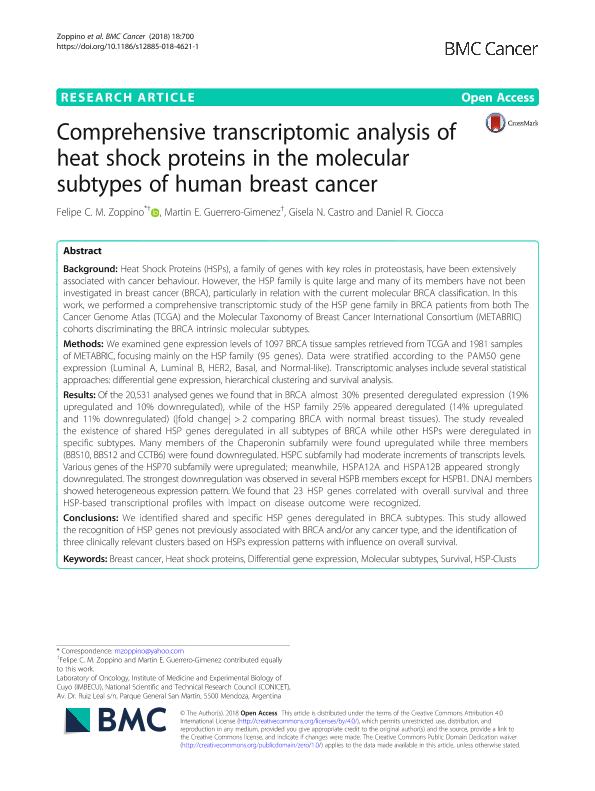Mostrar el registro sencillo del ítem
dc.contributor.author
Zoppino, Felipe Carlos Martin

dc.contributor.author
Guerrero Gimenez, Martin Eduardo

dc.contributor.author
Castro, Gisela Natalia

dc.contributor.author
Ciocca, Daniel Ramon

dc.date.available
2019-11-07T20:28:10Z
dc.date.issued
2018-06
dc.identifier.citation
Zoppino, Felipe Carlos Martin; Guerrero Gimenez, Martin Eduardo; Castro, Gisela Natalia; Ciocca, Daniel Ramon; Comprehensive transcriptomic analysis of heat shock proteins in the molecular subtypes of human breast cancer
; BioMed Central; BMC Cancer; 18; 1; 6-2018; 700-710
dc.identifier.issn
1471-2407
dc.identifier.uri
http://hdl.handle.net/11336/88248
dc.description.abstract
Background: Heat Shock Proteins (HSPs), a family of genes with key roles in proteostasis, have been extensively associated with cancer behaviour. However, the HSP family is quite large and many of its members have not been investigated in breast cancer (BRCA), particularly in relation with the current molecular BRCA classification. In this work, we performed a comprehensive transcriptomic study of the HSP gene family in BRCA patients from both The Cancer Genome Atlas (TCGA) and the Molecular Taxonomy of Breast Cancer International Consortium (METABRIC) cohorts discriminating the BRCA intrinsic molecular subtypes. Methods: We examined gene expression levels of 1097 BRCA tissue samples retrieved from TCGA and 1981 samples of METABRIC, focusing mainly on the HSP family (95 genes). Data were stratified according to the PAM50 gene expression (Luminal A, Luminal B, HER2, Basal, and Normal-like). Transcriptomic analyses include several statistical approaches: differential gene expression, hierarchical clustering and survival analysis. Results: Of the 20,531 analysed genes we found that in BRCA almost 30% presented deregulated expression (19% upregulated and 10% downregulated), while of the HSP family 25% appeared deregulated (14% upregulated and 11% downregulated) (|fold change| > 2 comparing BRCA with normal breast tissues). The study revealed the existence of shared HSP genes deregulated in all subtypes of BRCA while other HSPs were deregulated in specific subtypes. Many members of the Chaperonin subfamily were found upregulated while three members (BBS10, BBS12 and CCTB6) were found downregulated. HSPC subfamily had moderate increments of transcripts levels. Various genes of the HSP70 subfamily were upregulated; meanwhile, HSPA12A and HSPA12B appeared strongly downregulated. The strongest downregulation was observed in several HSPB members except for HSPB1. DNAJ members showed heterogeneous expression pattern. We found that 23 HSP genes correlated with overall survival and three HSP-based transcriptional profiles with impact on disease outcome were recognized. Conclusions: We identified shared and specific HSP genes deregulated in BRCA subtypes. This study allowed the recognition of HSP genes not previously associated with BRCA and/or any cancer type, and the identification of three clinically relevant clusters based on HSPs expression patterns with influence on overall survival.
dc.format
application/pdf
dc.language.iso
eng
dc.publisher
BioMed Central

dc.rights
info:eu-repo/semantics/openAccess
dc.rights.uri
https://creativecommons.org/licenses/by-nc-sa/2.5/ar/
dc.subject
BREAST CANCER
dc.subject
DIFFERENTIAL GENE EXPRESSION
dc.subject
HEAT SHOCK PROTEINS
dc.subject
HSP-CLUSTS
dc.subject
MOLECULAR SUBTYPES
dc.subject
SURVIVAL
dc.subject.classification
Bioquímica y Biología Molecular

dc.subject.classification
Medicina Básica

dc.subject.classification
CIENCIAS MÉDICAS Y DE LA SALUD

dc.title
Comprehensive transcriptomic analysis of heat shock proteins in the molecular subtypes of human breast cancer
dc.type
info:eu-repo/semantics/article
dc.type
info:ar-repo/semantics/artículo
dc.type
info:eu-repo/semantics/publishedVersion
dc.date.updated
2019-10-21T20:12:48Z
dc.journal.volume
18
dc.journal.number
1
dc.journal.pagination
700-710
dc.journal.pais
Reino Unido

dc.journal.ciudad
Londres
dc.description.fil
Fil: Zoppino, Felipe Carlos Martin. Consejo Nacional de Investigaciones Científicas y Técnicas. Centro Científico Tecnológico Conicet - Mendoza. Instituto de Medicina y Biología Experimental de Cuyo; Argentina
dc.description.fil
Fil: Guerrero Gimenez, Martin Eduardo. Consejo Nacional de Investigaciones Científicas y Técnicas. Centro Científico Tecnológico Conicet - Mendoza. Instituto de Medicina y Biología Experimental de Cuyo; Argentina
dc.description.fil
Fil: Castro, Gisela Natalia. Consejo Nacional de Investigaciones Científicas y Técnicas. Centro Científico Tecnológico Conicet - Mendoza. Instituto de Medicina y Biología Experimental de Cuyo; Argentina
dc.description.fil
Fil: Ciocca, Daniel Ramon. Consejo Nacional de Investigaciones Científicas y Técnicas. Centro Científico Tecnológico Conicet - Mendoza. Instituto de Medicina y Biología Experimental de Cuyo; Argentina
dc.journal.title
BMC Cancer

dc.relation.alternativeid
info:eu-repo/semantics/altIdentifier/doi/https://doi.org/10.1186/s12885-018-4621-1
dc.relation.alternativeid
info:eu-repo/semantics/altIdentifier/url/https://bmccancer.biomedcentral.com/articles/10.1186/s12885-018-4621-1
Archivos asociados
